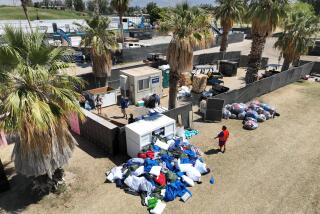Recycled Wheelchairs Await Gentle Push
- Share via
Therese Allen had just gotten a new set of wheels. The question was, what to do with her old ride?
“It was in pretty good shape. My mechanic offered to buy it. But I thought it would be nice to give it to somebody who really needed it.”
Therese, left a quadriplegic by an auto accident at age 14, wants her old powered wheelchair to make someone feel what she felt when she received her first one back in 1975, after two years in a manual chair.
“It gave me freedom. It gave me a whole new life,” Therese recalled. In the manual wheelchair, “people would forget me sometimes. I missed a class that way . . . Just being able to turn around when I wanted to was just something wonderful . . . It’s something I’ve never forgotten.”
Her quest led her to Wheels for Humanity, a Studio City-based charity with modest resources and an ambitious mission. It collects and refurbishes used wheelchairs, then distributes them to needy people in poor countries. David Richard, the 40-year-old president of Wheels for Humanity, says Allen’s old chair is now getting a tune-up in a shop at a prison in Sioux Falls, S.D., and may soon be shipped with other chairs to the Dominican Republic.
To look at the joyous faces in Richard’s scrapbook--of, say, once bed-ridden Central American children being placed in their first wheelchair--is to understand why so many people are quick to lend a hand.
He showed me the scrapbook last Saturday at a children’s performance of “Cinderella” sponsored by a group called Unification of Disabled Latin Americans (UDLA). Recycling wheelchairs, he explained, has been a mission of his family since 1988. That year, his brother Mark was in Guatemala doing missionary work. He saw a woman crawl across a dusty road and thought of a friend who relied on a wheelchair because of polio. Mark Richard spoke to the woman and resolved to get her a wheelchair.
When Mark returned to the Richards’ hometown of Madison, Wis., he was able to collect 20 used wheelchairs, which he then delivered to the woman and others in need. Over time, Mark continued to collect wheelchairs and became affiliated with a Christian charity that distributed medical aid. He now earns $30,000 a year heading Hope Haven, a Rock Valley, Iowa, facility where retired farmers and persons with disabilities refurbish old wheelchairs collected by Wheels for Humanity and other groups. Mark also works with the wheelchair repair facility at the Sioux Falls prison.
Two years ago, David, a golf equipment salesman, joined his brother on a chair delivery to Central America. David has since collected and helped distribute hundreds of used chairs. With friends at First Christian Church in North Hollywood, David incorporated Wheels for Humanity and applied for tax-exempt status with the Internal Revenue Service. In the meantime, donations are being collected through the First Christian Church.
So far, the charity has raised only $5,600, David says, but has managed to collect and store hundreds of chairs because so many individuals and businesses such as Galpin Ford and Sam’s U-Rent have loaned trucks, and landlords have allowed him to use vacant warehouse space. “I’ve been very blessed,” David says.
But he has also learned that such help is often temporary. A few months ago, Wheels for Humanity had to vacate donated warehouse space in Simi Valley that had been rented to a paying tenant. Another property owner provided space in Pasadena. But this week, Wheels for Humanity received word that it would have to move out by Aug. 15.
Finding new storage space now occupies much of David’s time. Like his brother Mark, David is hopeful that Wheels for Humanity could evolve into a charity that could pay him a salary and enable him to drop his commission sales job. David, divorced and the father of a 6-year-old girl, says he’s put so much time into wheelchairs that he’s cashed in his 401K retirement savings plan, at considerable penalty, just to pay his bills. He envisions that the organization may someday have a facility in Los Angeles where persons with disabilities would work as volunteers refurbishing used wheelchairs.
“Those guys in the wheelchairs, they want to refurbish wheelchairs--for free,” he says. “They just don’t have a place to do it.”
Therese Allen understands. Therese, who had accompanied David to the performance of “Cinderella,” has become a volunteer for Wheels for Humanity. She has been calling warehouse facilities and friends, hoping to find a donor. She uses her tongue to punch in the telephone number.
Most storage facilities, says Therese, say they don’t donate space. But she tries to get a fax number, so that David can send them information. The day I dropped by the Wheels for Humanity office, Therese had left a message with several fax numbers.
There’s an easier way to reach Wheels for Humanity. The phone number is (818) 766-8000.
Scott Harris’ column appears Tuesdays, Thursdays and Sundays. Readers may write to Harris at the Times Valley Edition, 20000 Prairie St., Chatsworth 91311. Please include a phone number.
This week, Wheels for Humanity received word that it would have to move out by Aug. 15.
More to Read
Sign up for Essential California
The most important California stories and recommendations in your inbox every morning.
You may occasionally receive promotional content from the Los Angeles Times.













